This page tells the story of a group of Yemenite Jewish pioneers who moved to the bank of Lake Kinneret in the early 1900s. They wanted to cultivate the land. It describes their struggle and the disappointing end.
Also in the Jews of Yemen Docuweb:
 Relations with
Relations with
their Local Neighbors
________________
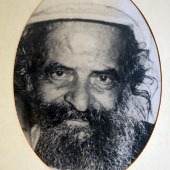 Kinneret and Yemenite
Kinneret and Yemenite
Pioneers
________________
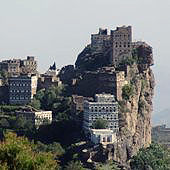 A Brief Background
A Brief Background
About Yemen
________________
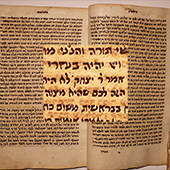 Jewish Scholars
Jewish Scholars
of Yemen
________________
 Personal Stories
Personal Stories
________________
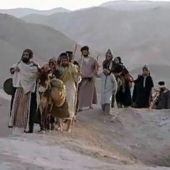 When did the Jews
When did the Jews
Arrive in Yemen?
________________

Missing Children
Affair
_______________
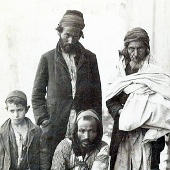 Early Immigration
Early Immigration
________________

Yemenite Jews &
American Colony
________________
 Customs, Culture and
Customs, Culture and
Folklore
________________
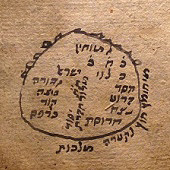 Links with
Links with
Other Jewish Centers?
________________
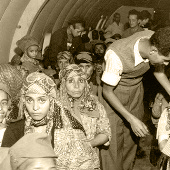
Operation 'On Wings
of Eagles'
________________
| Kinneret and the Yemenite Pioneers
In 1911, a group of a few dozen families from Sharaab in the south of Yemen, picked up their goods and came to the Promised Land. This page focuses on the challenges and obstacles that faced one branch of this group who set up their homes beside Lake Kinneret.
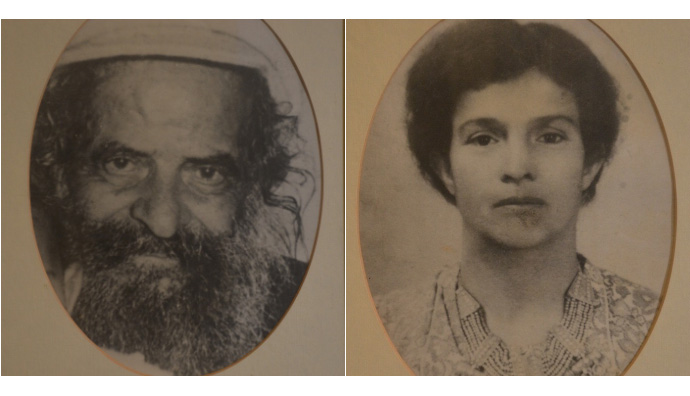
Background
The immigration of the Jews of Yemen at the end of the 19th century was mostly characterized by hardships. Among other things, financial, social and cultural differences created a conflict between the immigrants who came from the near east and those who came from east Europe.
Although the final destination for both groups was the land of Israel, the immigration from Yemen was a result of the continuous religious longing for the land of Zion while the reason for the group from Eastern Europe was political and national.
The connection of the Jews of Yemen to the land of Israel was continuous throughout the centuries, characterized by immigration and emigration back and forth of small groups and individuals. The fact that the ruling regime in the area was the same over many centuries eased this activity substantially. In the early years of the 20th century there were a few thousand Jews from Yemen who lived in cities like Jerusalem, Jaffa, Tiberias, Zafat, while some others lived in agricultural villages like Rehovot, Zichron-Yaakov, Hedera. In the latter places they worked mainly in agriculture or providing services.
What was the Office of the Land of Israel?
The ‘Office of the Land of Israel’ is also referred to as ‘The Israel Office’ or ‘The Palestine Office’. It was an acting arm of the World Jewish Zionist Organization in the land of Israel. It was responsible to promote, plan, finance and manage the Zionist activity in the country. This included buying land, building cities and agricultural settlements, directing the immigrants to the different places and helping to provide guidance for the required activities. They created agricultural schools and farms. The farm beside Lake Kinneret was one of the projects of this office.
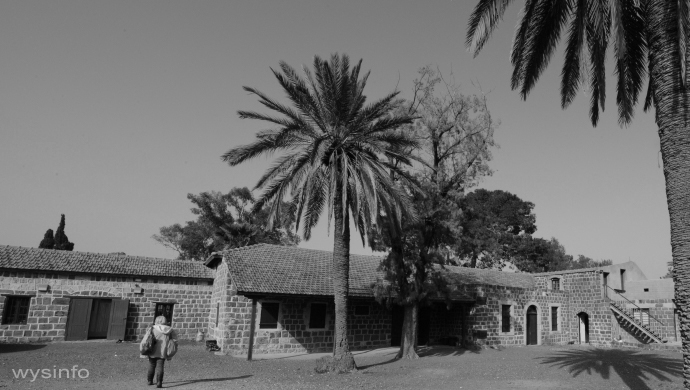
The Need for a Workforce
The aim of the Zionist Organization was to create a secular political entity in the land of Israel. The waves of immigrants who came from east and west required building of financial, industrial and agricultural infrastructures. Land was bought in the center and in the north of the country. Settlements were created and there was a need for a work force. Many of the immigrants from the west did not fit and did not want to do the hard agricultural work. At a certain point it became popular to hire Arab workers but this disturbed the leaders of the Zionist organizations since it conflicted with their ideology of using Jewish labor.
Following a partial positive experience that the farmers of the new agricultural villages had with the work of Yemenite Jews, who came from the rural parts of Yemen (like those who came from Hidan), the Jewish leaders decided to bring in a massive number of Jews from Yemen. They assumed, based on the recent experience, that Yemenite Jews were people who are capable of hard work, who do not require a lot for living, who have no ambitions or any requirements or needs for culture and leisure. They seemed, in the eyes of those leaders, as the embodiment of the ‘natural worker’ (in their terms). They felt that the Yemenite Jews could replace both the Arab workers and also the Jewish workers from the west who were more expensive and, in their opinion, also had other needs like culture and a desire for knowledge and education.
A Mission to Yemen
Shmuel Yavnieli, (Varshevsky), a Russian born Jew, was selected for a mission to Yemen, as a messenger, in order to stimulate the Jews to come to the Promised Land in large numbers. He prepared himself by learning the Yemenite Jewish code of behavior, and left Israel in mid December 1910, through Port-Said, Suez-Canal, Red Sea, Aden, and from there into Yemen.
Indeed, his mission succeeded above all expectations. Masses of Jews, learning about the Jew from the Holy land on his white donkey, talked about a return to Zion that triggered their imagination. Thousands of Jews left their homes, gathered their families and started the long and difficult journey to Israel. This was not what the leaders of the Zionist organizations expected to see. They wanted a young strong work force and the result was thousands of Jews who came with their families – young, old, infants, healthy and sick. There was no infrastructure in place to receive them. An urgent request was sent to stop the flood which eventually diminished.
From Yemen To Lake Kinneret
In 1911, the group of Jews from Shar-ab arrived in Israel after many weeks of a long, hard, difficult journey.
They sold their houses and properties and then realized that the Arabs would not let them leave. After overcoming this obstacle they started a three weeks’ journey by foot to Aden, by the shore of the Indian Ocean, in order to take a ship to Israel. Along the way they were hijacked by different road robbers and were forced to pay bribes in order to be able to continue.
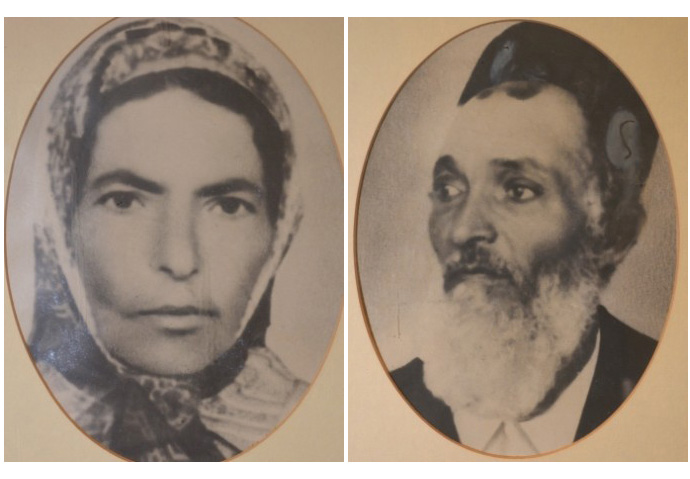
After a few months in Aden they went by boat to Suez in Egypt and from there continued to Jaffa. A strong storm at sea would not allow them to land on the shore. Therefore they continued, tired and broke, to Haifa. There they met farmers who offered them work in Hadera where they stayed until 1912.
The conditions in Hadera were more difficult than they could bare. They worked long hours for meager wages that were not enough to support them. They lived in huts and in dilapidated filthy warehouses that housed families of mice and rats, experiencing extreme heat in the summer and freezing cold in the winter. When they complained about the inhuman conditions they were asked by members of the “Young Guards” if they were interested in moving to the Galilee, beside Lake Kinneret, where there was work and also better conditions. They were told that they would also have land to cultivate and houses to live in.
The group agreed. The wives and children went by train and the men rode on carriages until they arrived to the southwest bank of Lake Kinneret.
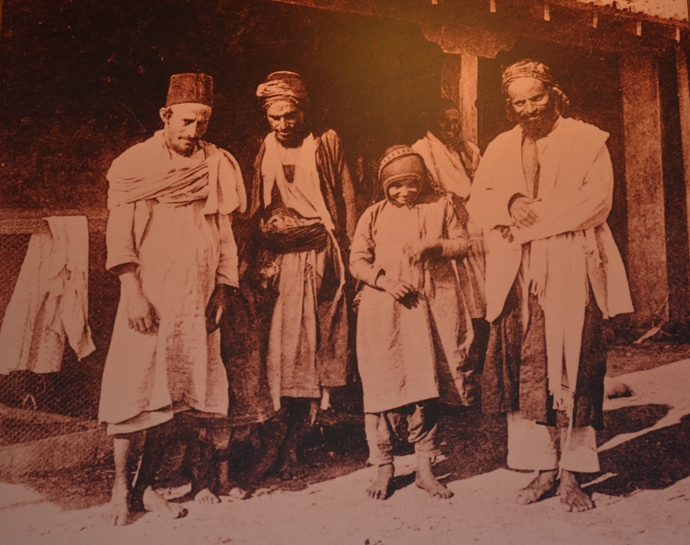
When the group arrived to Kinneret in 1912, there were already a number of agricultural settlements that had been created a few years earlier. The ‘Kinneret Farm’ school was established in 1908 by the ‘Israel Office’ on land that was bought by KKL – JNF (Keren Kayemeth LeIsrael – Jewish National Fund). It was built as a spot for agricultural training. The village Kinneret was created at the end of 1908 beside the farm and Dganya was built in 1910.
Early Conditions for the Pioneers beside Lake Kinneret
Some of the members of the Yemenite group separated off in an attempt to settle in Yavniel, a few kilometers west of Kinneret. The others, 14 families (45 people) decided to stay in Kinneret. Since they had no shelter, they were offered to live temporarily in a structure that housed the water pump motor. The structure contained 2 service rooms. The 14 families agreed to move to the 2 rooms. They built 5 mud huts to temporarily accommodate them all and prepared themselves for the routine activity of work and bible studies that they used to experience in Yemen. According to Avraham Hartzfeld, one of the Jewish leaders at that time and the head of the ‘Agricultural Center’, at the beginning the group owned a pair of cows and a carriage, two donkeys, a plough, and a horse, all purchased from the ‘Agricultural Center’.
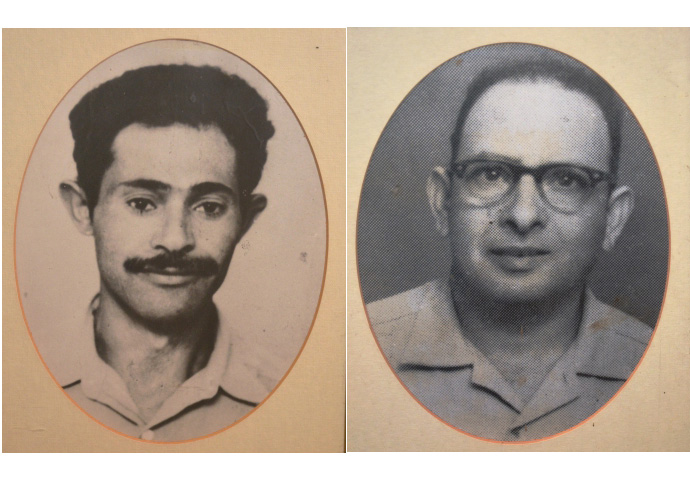
The area that they settled on was muddy; it contained mosquitoes carrying pathogens that were responsible for substantial illnesses and death among the members of the group. There was an urgent need to dry it.
Even though the group was short in proper tools to handle the situation, it succeeded meticulously and with hard work to clear the volcanic stones, eliminate the weeds and remove the long tough roots of the jujube trees that grew all over. They planted eucalyptus trees and grew vegetables that were successfully sold in the area. The low sea level location of their fields allowed early ripening of their products and they were able to sell them as far as Damascus.
Promises and Frustration
A few years passed and they were still living in the 2 rooms in the motor house and in the 5 huts that they themselves built.
In November 1914 the Jewish Yemenite group sent a letter to the head of the ‘Office of the Land of Israel’, Arthur Rupin, asking for help since promises made by the department of settlement were not yet fulfilled.
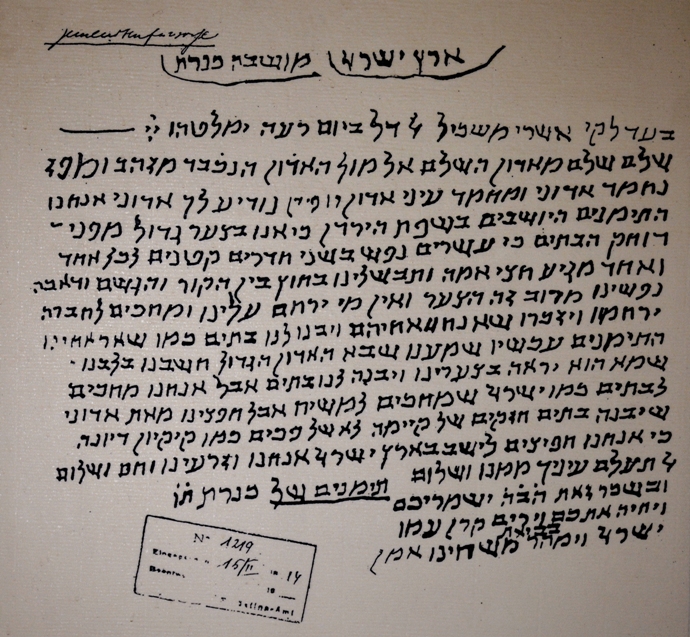
Expand for the translation of the above letter….. Land of Israel – Kinneret Village With the help of god, for your salvation we hope. Bless the wise who sought the poor. In judgment day he will be rescued. Peace, peace from the G-d of peace to the respected sir, more than gold and precious stones, the honorable man and the treasure of our eyes, Mr. Rupin. We will say so. We, the Yemenite s who are settled by the bank of the Jordan, are in a big sorrow because of the dense housing, since there are twenty people who live in two small rooms and there is half a foot for each. Our cooking is done outside between the cold and the rain and our souls are in pain and there is no one to pity us. We are waiting for the society to say that they are our brothers and build us houses like the other Yemenites have. Now that we heard that the great master came, we thought in our hearts that he may see our sorrow and build us houses. But we have been waiting for it the same as the sons of Israel have been waiting for the Messiah. We were hoping that the honourable gentleman would build strong lasting houses, not huts and the like that are built of tins, since we want to settle in the land of Israel and we want to seed. And G-d forbid that you turn your eyes from us and disappear.
If you guard us, G-d will guard you and will raise the horn of Israel and will bring the Messiah earlier – Amen.Translation
Five of 10 houses that were promised to them by the department of settlement were built. The rest were not, under the claim of financial shortage since the channel of contribution of money that was promised from overseas by the Zionist agency ceased to function properly due to the start of the 1st World War.
The Yemenite group paid rentals monthly for the 5 buildings that were built. A letter with the rates was sent to the ‘Office of the Land of Israel’.
Expand for a copy of the letter and its translation..... Kinneret August 13th 1915
To the ‘ Office of the Land of Israel’
We received your message by Mr. Orlintzki, and we credited your account for rental in Kinneret for the months of Iyar-Av (Jewish Months total of 4 Months):
Rent for house No. 1 in Kinneret from David Ben Natan 20 PS
Rent for house No. 2 in Kinneret from Natan Ben Natan 20 PS
Rent for house No. 3 in Kinneret from Avraham Ben David 20 PS
Rent for house No. 4 in Kinneret from Zeharyahu Ben Israel 20 PS
Rent for house No. 5 in Kinneret from Yosef Ben Israel 20 PS
Total: 100 PS
We note that from the month of Elul (Jewish Month) we have to collect from these Yemenites and every month a sum of 5 PS per month and we will credit your account with these sums.
With respect,
On Behalf of the Commitee of the Galille workers
K. Klainman.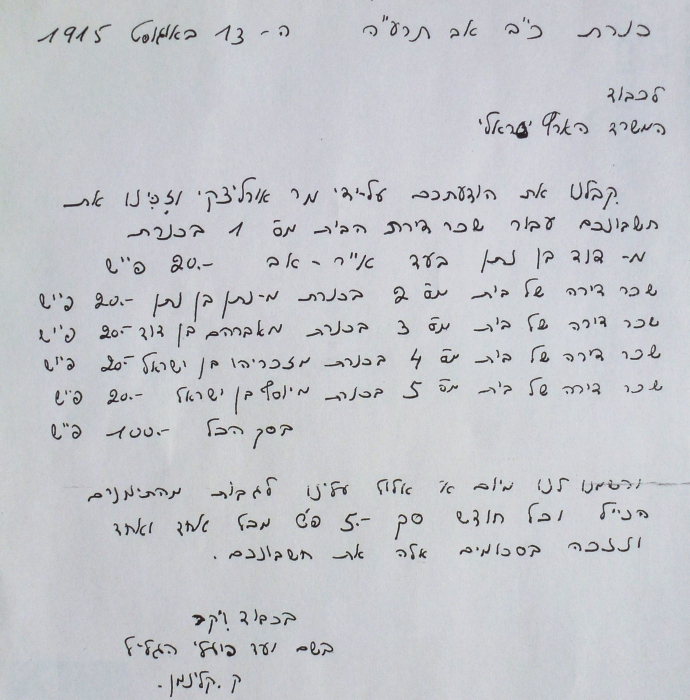
Translation
The lots they received were not enough to support the families. The issue of water was also problematic. Consequently some of the members of the group found additional work building roads, in agriculture as employees, after the war as guards in the British Army and in the power station in Naharaim that was located a few dozen kilometers south of Kinneret.
New Arrivals and a Need for Cooperation
In 1913, almost a year after the Yemenite pioneer group arrived and settled beside Lake Kinneret, a new group of three east European youths, who called themselves the ‘Shlishiat Hayahad’ (the United Three) arrived to the Kinneret farm. This group had moved around in an effort to promote Jewish work in the area. Eventually they were advised, by the Israel Land Office led by Aurthur Rupin, to settle in Kinneret farm. Within a short time the group grew to include three women and thirteen men (altogether a group of sixteen that was called ‘Kvutzat Kinneret’).
At the beginning, relations between the Jewish Yemenite group and the group of ‘Kvutzat Kinneret’ were acceptable and there were, according to some witnesses, nuances of good neighborhood and common help between individuals.
Emergence of a Conflict
From 1918 things shifted and conflicts regarding land and water started. Adding to that was a rejection, on the part of ‘Kvutzat Kinneret’, to having the Jewish Yemenite group in the area based on a claim, among other things, that there was a cultural difference between the groups.
Meanwhile, Rabbi David Ben Israel, who volunteered to live in one of the two small rooms in the ‘house of the motor’ where the water pump was located, was still there in February 1923. This was eleven years from when he arrived to Kinneret. He lived there in a building that was not suited for living, with the continuous noise of the pump, trying to raise his family. Adding to these hardships, he suffered from the death of a daughter who fell off the building’s ladder. In February 26th 1923 he sent a touching letter to the Zionist Management asking for help.
Expand for a copy of the letter and its translation..... Tiberias Monday 26.2.1923 Honorable Zionist Management in the Land of Israel Honored Sir, Allow me to clarify before you my situation as it is. This is 11 years since I left my country Yemen, and I came to the Land of Israel. Here I have been living by the water pump beside the village of Kinneret, and I suffer very much. All my donkeys were stolen by thieves that entered into the house. Poultry is not possible to breed here since the foxes eat them, and also, at night I cannot rest because the noise of the water pump disturbs my sleep. Fever also attacks me very often. This is my sad condition here in this ruin of a house that no man can live in, where my daughter fell off a ladder and died. So since the Zionist Management always needs the advice of the Yemenites, I therefore ask you to hurry and help me and deliver me from this ruin that has brought me to depression and to help me so I can settle in a Jewish village that has a home. I hope that my request will find an echo in your heart. I end with much respect David Ben Israel My Address: David Ben Israel, Yemenites of Kinneret, beside Tiberias, Land of Israel.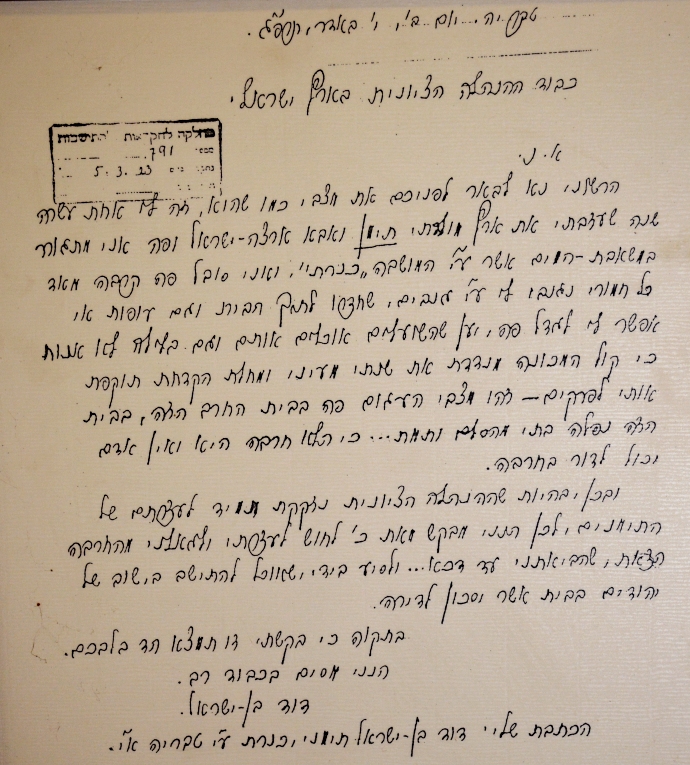
Translation
On October 8th 1923, 11 years after they arrived to Kinneret, the Jewish Yemenite group sent a letter to the Zionist management urging it to complete building the houses that were promised to them.
Expand for a copy of the letter and its translation..... Translation To the Zionist Management
Respected Sir
We hereby conform your decision to spare a lot of 100 dunams with irrigation and 100 dunams in the mountains. We will be satisfied for now until you will be able to spare more land for us for agriculture. As a result of shortage of buildings, our cattle are left outside and a cow was stolen from us this week. We are sure that you will try, as soon as possible, to start with the building of the houses and the cattle stall. In case we will not get from you any message until Monday, we who are signed below will have to go to Jerusalem. We ask from Mr Shtern to try to send us good seeds for tobacco, as soon as possible.
In honor, Yemenites of Kinneret.
1. Yosef Ben Israel
2. Israel Ben Yosef
3. David Ben David
4. David Ben Israel
5. Yosef Ben David
6. Avraham Ben David
7. Yehuda Ben David
8. Moshe Ben Haim
9. David Ben Natan
10. Se-adya Ben Natan
Kinneret 8.10.1923. 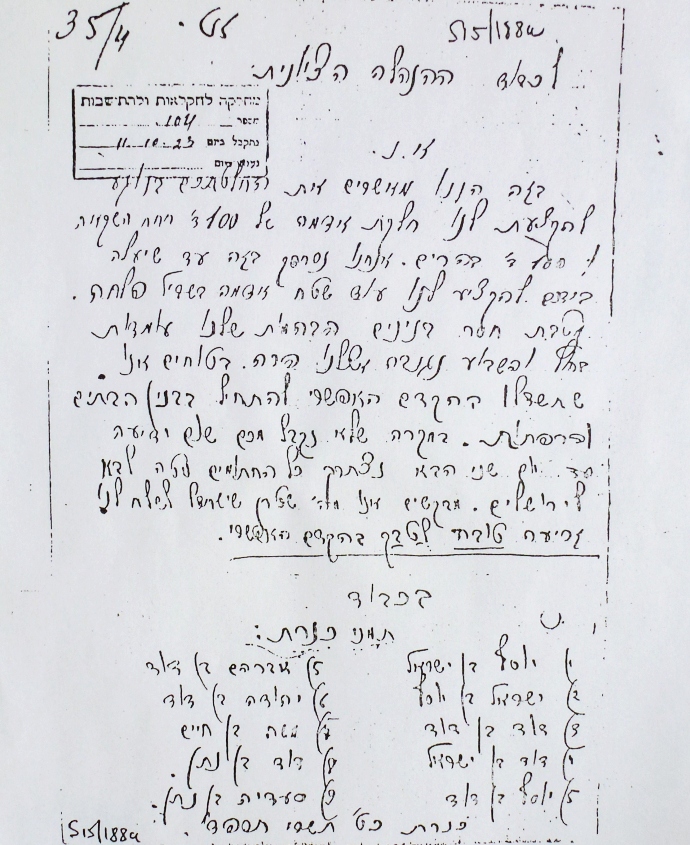
On October 31st 1923 ‘Kvutzat Kinneret’ sent a telegram to the Department of Settlement complaining about the building of houses for the Jewish Yemenite group. These missing houses where promised to the Yemenite Jews a number of years before.
A response to this telegram was sent 3 weeks later. In it there is an order to stop the process.
Expand for a copies of the telegrams and their translation..... Telegram from Kinneret to the Agriculture Settlement Department.
Date: 31.10.1923
We wonder about the start of building of the Yemenite houses before the arrival of the Committee.
‘Kvutzat Kinneret’
—–
Telegram on behalf of the Agriculture Department
Date: 21.11.1923
Do not start the work for the Yemenites in Kinneret – since there is an appeal on behalf of ‘Kvutzat Kinneret’. Need to wait for a new order.
The Department. 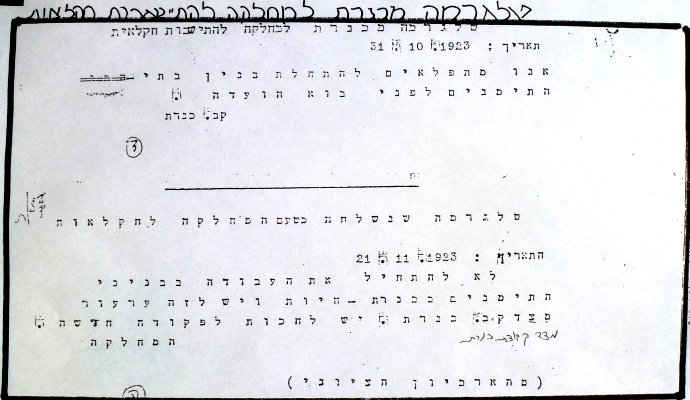
Translation
One of the board members who saw the living conditions of the Jewish Yemenite group was Moshe Smilansky, a Zionist leader at that period. In a strong criticism of the Settlement Department he wrote… (See translation below)
“….If there is anybody who is responsible for the establishment and the existence of these two settlements (Kinneret and Yavniel) his place is in the court house bench….
“The heads of this department (Land of Israel Office) visited these settlements, sometimes directly and sometimes indirectly, and I ask them, facing man and God, how could they let human beings, who were created by God, live year after year in such conditions that no normal person from the yishuv would allow its cattle to live in? ….”
“(They, the Yemenite group, are)… shadows of men and women, skeletons of children, (with) eyes full of despair, fear, anger and bitterness, dressed with ragged clothes and facing the danger of hunger. And these strange creatures – ten families – already live 15 years beside a marsh, in 5 huts of mud covered with tins. And when you look into these “houses”, you will be shocked. The walls have holes, the roofs are broken, and the doors are ruins. During 15 years half of their members have died and now, these ten families do not have even a Minyan for praying….”
At the end of the day, when a decision had to be made regarding who was going to stay on the disputed land, it was Moshe Smilansky, together with Arthur Rupin, the head of the Israel Office, who signed on the document that forced the Yemenite group to leave.
Decisions and Consequences
The truth of the matter is that the members of ‘Kvutzat Kinneret’, who arrived in 1913 and who lived temporarily in ‘Hatzar Kinneret’, reached a stage where the group had to decide where it was going to settle permanently. Two options were presented to them. The first one was to move to Dalhamia area (Ashdot Yaakov of today) about 15 km west of Kinneret. The second option was to settle on the hill, which is the current location of the group.
After strong continuous and effective pressure by ‘Kvutzat Kinneret’ and the lobby that was active for it’s cause, the decision of the Settlement Department was to move ‘Kvutzat Kinneret’ to the location that they preferred. The meaning of this decision was that there was not enough land for both groups. The conflict reached to a point where the water supply to the fields and sometimes to the houses of the group of the Yemenite Jews was cut intentionally.
Rabbi David Ben Israel Tzeiri of the Jewish Yemenite group complained about it in a letter sent to the authorities. A small part of this letter is quoted below:
“…. And in all the lot that we held we grew vegetables. When the vegetables started to give fruits, the group closed the water on us until they dried, and we lost them, and all the work we did disappeared…. And we were left insulted and we have no help and no support and we are also being cursed….”
Forcing the Yemenites to move away from Kinneret
The Jewish Yemenite group arrived to Kinneret in the spring of 1912, almost a year before ‘Kvutzat Kinneret’. They succeeded, despite all odds, to sell their agricultural products in the area and as far as Damascus, and to raise a new generation. In spite of the fact that they were a much larger group and had already settled themselves in the area, they lost in the confrontation with Kvutzat Kinneret. The clash between the groups continued until 1930 but, having no backup and no contacts, the Yemenite Jews were forced by the Israel Land Officials to leave and were sent for a new beginning in Marmorek beside Rehovot.
The decision to move the group from Kinneret did not come without controversy. Shmuel Dayan, a farmer and one of the Zionist leaders at that time, expressed his feelings regarding this issue. In ‘Hapoel Hatzair’, the workers’ newspaper at that time, he wrote:
“… The houses of the Yemenites, naked of wood, protest in silence, scream and demand justice in their silence, and all of us are to be guilty…
….they, alone and rootless, are among those who created this land; they dug like us in hardship and in sweat, and in loses, they overcome us. Their suffering is greater and their joyfulness is less than all the people who live here”.
Hapoel Hatzair” volume 25 c 28. July 1930. Shmuel Dayan
Rabbi David Ben Israel – A Call for a Moral Compass

Rabbi David Ben Israel, the Rabbi of the Yemenite Jewish group of Kinneret, described in 1928, in a very moving and strong letter to the Zionist Organization, their experience from the time they left Yemen until after the decision to move them was made.
Expand to read the English translation of the letter written by Rabbi David Ben Israel to the Zionist Organization..... Hardship is the state of Yemenite Jews of Kinneret since they arrived from Yemen. It is known that in Yemen we knew the reason for our suffering and that we were happy with what we had. We were waiting for the delivery of our G-d, keeping our religion, until G-d would deliver us and we would go to our country by the King of the Messiah. After that, we heard that our brothers entered the land of our forefathers and that there was a management that handled every one who entered the land of Israel to work on KKL land; and that the land of Israel absorbed the incoming and each was helping the other. Then, our brothers abroad gave money to revive the land and to gather the sparks of holiness from the non kosher land to the sacred land. But we were poor and there was no money for us to immigrate to Israel. So we said, since we were not able to stay in our land we would wait until he (G-d) would come to deliver us. After that, Eliezer Yavnieli came to Yemen in 1911 (תרעא) and told us the right thing and said, “I am the messenger from the ‘Office of the Land of Israel’ and the company”. He said that any one who wants to come to Israel, it was on condition that he would work on the land of KKL. He said that the office would arrange anything that we would need for living as they do for all workers, and after working 3 or 4 years and getting used to the farm work we would get from the Office a house and farm (meshek) cattle, land and the tools like those of the farmers in Israel. “They were workers who were not farmers and you will be the same”. And the Office would arrange this until the country would be filled with farmers… and would grow more and more. We agreed to these conditions. We said, “At the beginning we used to work ‘as foreigners’ in the land of our enemies and now G-d has blessed us and with G-d’s help and we will immigrate to the land of our forefathers. So we will go to our land and will be sheltered under the wings of G-d, together with our brothers.” We left all the things we liked. The Arabs robbed us of all our cattle and homes and properties, since the Jews were going to leave them and go to the land of Israel, and they [the Arabs] were allowed to do so. And we went through much hardship on the sea and on land until we arrived into the land of Israel. We were received with disrespect, in dirty rooms in a warehouse for straw and in a slaughter house, with three families in a room. They said that these were difficult times and later things would settle slowly. We were cursed and for these reasons we became sick and we could not cope with it. Some returned to Yemen and some moved from one settlement to another in the hope that they would find peace for themselves. We Yemenites of Kinneret lived in Hedera, and we got malaria and ‘changes of air’, and we wanted to die from the shock and the fever. We decided to go to Tiberias and to Yavniel, to breathe the breeze and to change the air, maybe we would find a rest for our souls. When we were by the bank of the Jordan, we met two workers, Mordechi Harzan and David Yafe, the head of a group in Kinneret that was there. They told us that they would give us fulltime work and two rooms in the motor building. They told us: “Do not go to Rabbi Meir[a pilgrimage place where Rabbi Meir Baal Hanes was buried], sleep here and we will see if the Office agrees to this”. The Yemenites in Kinneret wrote him back, and the workers agreed on the [location] point for the Yemenites in the Kinneret. But the Office said that we should live in the ‘Motor House’, that we would work a year or two and later it [the Office] would build us houses and would give us land and anything that one needs for living; and that we would not have to work for others anymore. This was in 1912 ( תרעג). In Dganya there were 10 workers, and in Kinneret there were 8 from America and this group [Kvutzat Kinneret] did not exist. Among the Yemenites, 14 of them worked in Dganya and lived in Kinneret [where] the land was muddy and there were many jujube and the marshes were full of water. There was not even one tree neither in Dganya, nor in Kinneret; and nothing [was there]. We did all kinds of work; we suffered dirt, the smell of the marshes, and illnesses, due to the lack of housing and food. The Ashkenazi would receive from 4 to 5 bshlik and the Yemenite would get only 2 bishlik (for a day of work). The Ashkenazi would go home to good food, and sleep on a bed and rest, and would get up a new creature in the morning, and the Yemenite would eat bread and onion and would sleep on the floor. “Hoi” to the Yemenite for these shocks [they experienced] and the screams; and not being responded to. They [other people] would say: “The Yemenite can suffer, but we can not suffer like the Yemenites… and this is the way”. At the end of 1913 ( תרעד ), the committee came and told us that the Office agreed to build 10 houses for us, and the rest would be built slowly. They built 5 houses and did not build the rest. The rain interfered with the building and then ‘the crisis’ came growing and strengthening…. [here he writes about the 1st World War]…. And a beam of light grew which bought about the end of the 1st World War… Then, new workers came from Russia and from other countries. The Yemenite workers were dismissed and they [the farmers] took the new workers. We said that we had beginner’s rights; that this was the law from ancient times. We said to them that they were doing something that was immoral; that they gave the right of our work illegally to people that had come only days before, and that they destroyed the legitimate order of things. We told them that this was robbery done in plain view, that this was a shameful thing to do. This was what happened and there was no one to preach and no one who would do justice for this wrong in Kinneret. Since we were in need, although this was not in our favor, we approached the board and asked them to arrange for us to remove the jujube from the banks of the Jordan. This was work of two months and then it finished, and there was no work. What to do? And what would we live off? He [the board representative] said: “I will arrange for you to work independently. I will give each family a dunam, you will grow vegetables and you will live”. “This is the trail [plan]” he said “If you succeed, the board will assist you with houses and with land and with anything that one needs for life, and you will live a good life, and you will forget the hardships that you went through. Each family will get 25 dunam of land and tools and a house and cattle and you will pay me every year a known sum”. In the time of ‘the crisis’ most of us died and also after that. After the hand of the enemy was cut [end of the 1st world war], all the Jews of the land of Israel came out from the dark to light, and the Yemenites of Kinneret were still closed in the darkness of the Diaspora and did not find rest. The reason was – the Center [Agriculture Office] and the group [Kvutzat Kinneret] were laughing at us [playing with us] like with a ball, They postponed what they promised, putting us off from month to month, and promised that they would fulfill their promises and they told us not to be afraid since later it would be very good. In the year 1919, they built washrooms for ‘Kvutzat Kinneret’. We heard that they invested in it 1000 (punt), and this was from the money of our brothers abroad that opened their hearts to help the poor people in the land of Israel, while the Yemenites of kinneret were 5 families in a room in the winter, and in the summer living outside. The Central Office arranged for the Dganya group, and for Kvutzat Kinneret, and for the Um Juni group, and for another village in Israel Valley. And all of them came after us, and we were in ruins in the middle. What was the difference between one group and another? Who among the groups managed from their own pocket? Because if the money all came from our brothers, it is their prerogative whom to protect. The Yemenites of Kinneret came to Israel in 1911 (תרעב), and we arrived in Kinneret in 1912 (חשוון תרעג ). We worked and they promised year after year. In 1918 ( תרעט), they did a municipal council in Haifa. The assembly decided to build 15 houses; it was a clear [and final] decision, no lie. As of then there were 5 houses and 10 were going to be built in the next year. In the year 1920 (תרפא ), still nothing. We scrimped on everything, and waited to see what would be the end. In 1922 (תרפג ) we approached the management, which agreed to build 5 houses for those who were missing them. “When the group will grow”, they said “we will see what to do next”. They gave 25 dunam of land for each family and they sent engineers to see where the houses should be built. The Kvutza [Kinneret] interfered with the building and said that they did not want [us to build]. They sent Ben Tzion to the Central Office. New people from the Central Office came with the Central Board to Kinneret and they said that they did not want a Yemenite settlement in Kinneret and that the land in Kinneret should be for them [for “Kvutzat Kinneret”] and that the Yemenites should be sent to Nes Tziona. The Yemenites of Kinneret suffered hardships and shocks, and many (of them) died for the Kinneret soil. And after that they were doing this to us? Ohi for the Yemenite of Kinneret who were left orphans and there was no one to do justice but G-d. And what was this evil deed that they were doing? You are destroying the land of Israel. This could not stand within the Arab rules, and even more so not within the Jewish rules. But they were pompous, and did not listen to the poor and did not heed their needs (‘give an ear’). [They said] “If you listen to us, after Rosh-hashana [the Jewish New Year] we will build the houses, and you will enter to them in 1923 ( תרפד ). And we will give you travel expenses and all your shortages will be at the expense of the Central Office since we know that you do not have money and also because we are those that are taking you from here. If you do not listen to us, we will leave you here without order, until you get tired and then you will go by yourselves, and you will lose your rights”. We, (the Yemenite group) did not believe [the Central Office] since they had lied before. This was the last time. This was what they decided and they left. The Group [Kvutzat Kinneret] planted a vinyard instead of the houses in order to force the Yemenites out, as an act of looting and theft. And this was their approach, looting the poor and not thinking about anybody but themselves. And us…… not for ourselves, but all our efforts had gone toward the Kinneret. Firstly: we entered the land of Israel as workers in order to work on KKL land. Whoever came to the land as a city dweller managed to set himself up well. But they promised us year after year. If they had removed us from the beginning before all the hardships and death, we would have done nothing, since we would not yet have put all our strength, and our work in Kinneret, and our people would not have died for Kinneret; we would have gone to another settlement. But until now much time has passed and we hold the rights on the KKL land. Where shall we go? Never again! The previous period was better than after the English came, but now the situation is bad. And we had promises, and until now we have been thrown about and forgotten out of all the Histadrut Employees’, and we have written to the central office and they answered “…we will arrange things for you in a new settlement”. And we did not find anything but delays. In 1926 (תרפז ) we grew vegetables in all our lots that we owned, and succeeded. The Group [Kinnert] saw that the Yemenites still created life from the parcels of lots that they had and turned off the water that was being used by the Yemenites. And the vegetables, still needing to ripe, all were ruined. We went to the evaluator and he evaluated the loss at 90 punt. We were very angry and wanted to go to the government, and we said “It is impossible, we are part of the Histadrut and also we are Jews. How can this be done?” We went to the management and they told us that it was not their business, it was the responsibility of the Agricultural Center. We went to the Center. We waited and did not get an answer … until the month of Av [August]. We wanted to plant seeds for vegetables and they [Kvutzat Kinneret] closed the water on us. We wrote to the Center asking to come and to fix it. The board came and the group [Kvutzat Kinneret] said that they needed the water and that they would not give water to the Yemenites. And the board asked “How are the Yemenites going to live?” Then the board and branches and leaders and Ben Tzion and Beretz had a meeting and decided that they would arrange 200 dunam of land for the Yemenites, and would give them a loan to seed wheat and barley until collected. And the group [Kvutzat Kinneret] would seed and plough the fields with machines and then the Yemenites would pay back whatever they owed. And the Center would give 2 cows and a carriage. And one of the Yemenites would work with the carriage in the Rotenberg Company or on the roads, and the rest would work with their hands until all were settled. And also would feed the cattle. And the group [Kvutzat Kinneret] would give one hour of water for each family to grow their own vegetables. This is what they decided, and it was in the month of Av [August]. And now it is the month of Tevet [January], and nothing was done. And now the Yemenites sit under siege because of the shock and the shortage. A worker receives 15 grush and must accommodate 4 other people at home. Is this enough? And if there is no work? He sits at home hungry, with all around him knowing that the Yemenites of Kinneret live in poverty because of the damage of the disorder and the unfulfilled promises. The Center gave money to the group [Kvutzat Kinneret] to build spacious houses with an upstairs and a downstairs, and left the Yemenites thrown about and struggling in the cold of winter and in the heat of the summer. The government doctor warned us that the cold was the reason for all illness. For example, if there are 2 people and one has bread to eat and has meat and fish and the other is hungry, who should be helped between the two? Because of this, we are asking from the new management to come and visit and look at the Yemenites of Kinneret to see what our situation is, and to help remove us from this siege that we are under. And that all our believing brothers that opened their hearts to give money to the land of our forefathers, will see the situation and hold the hands of poor. Because of the many sins, their money is used for bribes and false payments in the hands of the boards and the leaders. They take money, eat and dress and refine themselves and whoever they want they help, with nice houses and in various utensils. And there is no mercy for the poor who are lying in the sand and eaten by fleas. But they [the poor] are, in their eyes, like “sichim v tzninim” [bushes and thorns] and from year to year they postpone their promises to the Yemenites: “We will build proper spacious houses, not like the first ones from mud and stones, and you will be safe, ready and prepared to enter into the house quiet and safe.” Until now we are living in sorrow and despair, and a pity that we are staying among people who are not merciful. Most of us died in the house of life and the rest are in sorrow and looked upon with contempt. This is the state of the Yemenites. But we will ask from the creator of above and below who will give, in the heart of the management, and all of our brothers, the sons of Israel, who have the power in their hands, to arrange the remains of the Yemenites. There are those who have been in the Histadrut and who never approached the Yemenites and never came to them, but only gave promises that were never fulfilled. The Yemenites of Kinneret never found peace from any side, whether regarding the houses or regarding life at all. And now we are hoping for the compassion of G-d, and of our brothers, the people of Israel, who feel for us. Since we have no hope except what can come from them, since they can save us from this ‘Diaspora’. Our young have perished with disappointment, we worked hard and our strength diminished. And now we are in sorrow and sighing … until now we are burdened and sinking, and there is nothing else. And what will be our future? And what will be the cure for our illnesses? We are poor, we have no money, and all of this is a result of the lack of order. If the Center had wanted to settle us as it did with all the other groups and settlements that came after us…. We would have already influenced kkl לק”ק, but we are still writing, although we have been in Kinneret 16 years. Translated by Wysinfo from: Periodical of the Association for Society and Culture in Israel, Resonance, Volume 13, Page 50. Quoted within an article by Zion Bar Maoz
The case left a deep scar among the expelled families and among their children.
The story was going to disappear from the pages of history of the future State had it not been for a random meeting, years later. During an educational tour, a member of Kibbutz Kinneret met a daughter of one of the Yemenite pioneers who were expelled from Kinneret. A question was raised and the story was unraveled.
Kinneret – A Personal Story
The three part video below tells the story of the Yemenite Jews of Kinneret from a personal point of view. While the story unfolds in the videos we learn about the relations that grew between Amiram Idelman, a member of Kibbutz Kinneret, and Edna (Tzeiri) Maimon, the daughter of Se-adiya Ben Natan, who was expelled.
*
*
Following this meeting the case was exposed in the papers, radio, television and internet. Also articles, ballads, poems and songs have since been written about the story in an effort to prevent such cases from happening again.
***
External links
You can find more of our videos on Wysinfo Youtube channel.